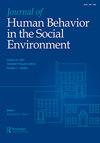体弱长者年轻成人家庭照护者心理弹性因素分析
IF 1.2
Q3 SOCIAL WORK
Journal of Human Behavior in the Social Environment
Pub Date : 2023-11-07
DOI:10.1080/10911359.2023.2273863
引用次数: 0
摘要
【摘要】越来越多的年轻成人家庭照顾者(18-34岁)为患有慢性、残疾或其他严重健康状况的老年家庭成员提供照顾。对年轻成人家庭照顾者及其在家庭互动和资源背景下的复原力知之甚少。利用2015年全国护理研究(NOSC)数据,本研究旨在探讨家庭弹性模型的三个要素:信念、家庭组织模式和沟通过程与照顾者压力的相关性。研究结果发现,NOSC的两个参数特别与较少的照顾者压力相关:完成培训和享受与照顾者在一起。此外,参数“感到孤独”,定义为有几个朋友,被发现与更高的照顾者压力显着相关。结果表明,了解独特的弹性因素和量身定制的干预措施对年轻成人家庭照顾者的重要性。本项目由纽约市立大学PSC-CUNY基金(2023-2024)资助,作者为作者。披露声明作者未报告潜在的利益冲突。机构审查委员会文件# 2022-0682,曼哈顿社区学院区,纽约城市大学。本研究由纽约市立大学PSC-CUNY基金(2023-2024)资助。本文章由计算机程序翻译,如有差异,请以英文原文为准。
Caregiver resilience factors among young adult family caregivers of frail elders
ABSTRACTYoung adult family caregivers (age 18–34) are increasingly providing care to their older family members with chronic, disabling, or other serious health conditions. Little is known on young adult family caregivers and their resilience in the context of family interaction and resources. Utilizing the 2015 National Study of Caregiving (NOSC) data, the aim of this study is to examine the correlation of caregiver strain, with the three elements of Family Resilience model: beliefs, family organizational patterns, and communication processes. The results of the study found that two parameters of NOSC in particular were associated with less caregiver strain: completed trainings and enjoying being with the care recipient. In addition, the parameter “feeling lonely,” defined as having a few friends was found significantly associated with higher caregiver strain. The results demonstrated the importance of understanding the unique resilience factors and tailored interventions for young adult family caregivers.KEYWORDS: Young adult family caregiversfamily resiliencecaregiver strain AcknowledgmentsThis project was supported by PSC-CUNY grant (2023–2024) from the City University of New York to Author.Disclosure statementNo potential conflict of interest was reported by the author(s).Institutional Review BoardFile # 2022-0682, Borough of Manhattan Community College, City University of New York.Additional informationFundingThis work is supported by PSC-CUNY grant (2023–2024) from the City University of New York.
求助全文
通过发布文献求助,成功后即可免费获取论文全文。
去求助
来源期刊

Journal of Human Behavior in the Social Environment
SOCIAL WORK-
CiteScore
3.70
自引率
0.00%
发文量
61
期刊介绍:
The Journal of Human Behavior in the Social Environment helps social workers firmly grasp developing issues in human behavior theories. It provides an outlet for empirically based articles about human behavior theory that facilitate social workers" practice goals. This innovative journal is the first to address the complexities of human behavior in relation to social work and its relevancy to practice. This makes it an essential resource for classes in human behavior in the social environment. Articles provide you with groundbreaking, up-to-date information on developments in empirically based human behavior theory. They address conceptual and empirical foci which study human behavior as a complex phenomenon.
 求助内容:
求助内容: 应助结果提醒方式:
应助结果提醒方式:


